Supply Chain Management ERP Modules - Grow From Good To Great
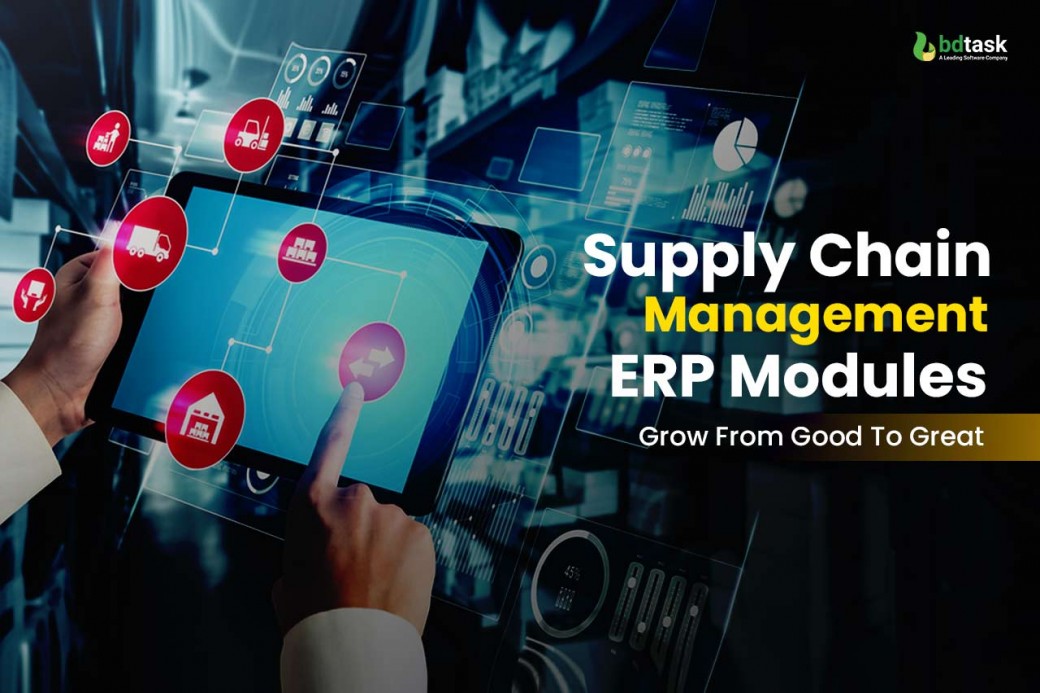
In today's fast-paced business landscape, efficient supply chain management ERP modules are essential for success. ERP Supply Chain Management (SCM) Module is a software application that helps end-to-end visibility and handles the whole supply chain.
Companies often rely on Enterprise Resource Planning (ERP) systems to streamline operations and gain a competitive edge. It helps the business plan and optimise the operation.
Conversely, it also increases the total operation efficiency, reduces the total costs, and achieves profitability.
ERP modules offer a 360° view of the entire supply chain.
Businesses need to automate their many departments and streamline their operation in Finance, Human resources, Production, Quality management, distribution, and Sales.
ERP system automates the supply chain functions relating to responsiveness while reducing the administrative burden and risk of human errors.
Organisations use ERP ecosystems for Software to collect business information, integrate disparate systems, simplify workflows, and achieve efficiency.
In this article, we will search into the world of Supply Chain Management ERP modules, exploring their significance and how they can streamline business processes effectively.
What Is Supply Chain Management?

Supply chain management is a crucial process that provides efficient services, the flow of goods, and information from the raw material suppliers to the end consumers.
It involves the
- Coordination
- Planning
- Execution
- Monitoring
From new products to delivering the final product, every step is interconnected in the supply chain, and efficient management is vital to optimise performance and meet customer demands.
Before you go, check the rest of the blog because you will miss many things.
What Is ERP? Let's Discuss The Basic
Organisations face increasing challenges in efficiently managing their complex processes and data in the rapidly evolving business landscape. Enterprise Resource Planning (ERP) systems have appeared as powerful tools to address these challenges by integrating various business functions into a unified system.
ERP systems are integrated software solutions that simplify and automate different business functions. Different business functions like
- Accounting
- Manufacturing
- Supply chain management
- Sales
- Marketing
- Human resources (HR).
—-----------------------------------------------------------------------------
A simple note to notice
The worldwide market for ERP software is set to reach $78.4 billion by the year 2026.
—-------------------------------------------------------------------------------
What Is ERP in Supply Chain Management?
To run every aspect of the business, ERP has done a great job from start to finish.
ERP is a comprehensive software solution in supply chain management that enables organisations to manage their core business processes efficiently.
It integrates various functions and data across departments into a single unified system, providing a holistic view of the entire supply chain.
ERP streamlines operations from procurement and production to distribution and customer service, leading to increased productivity and better decision-making.
Different Role of ERP in Supply Chain Management
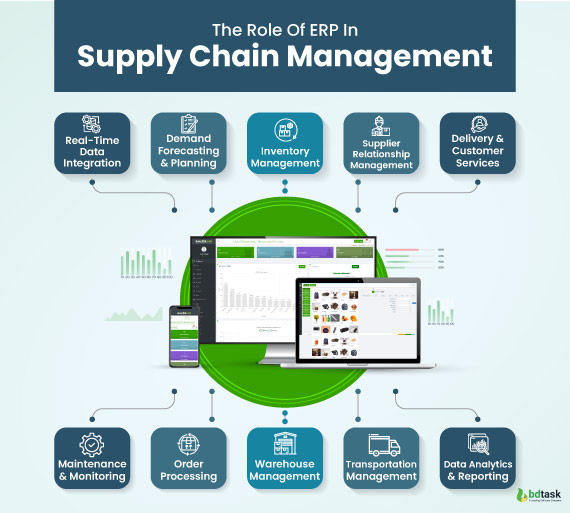
ERP system has become the table key point for businesses looking to use resources properly.
ERP software solution has surprisingly affected how businesses operate, directly connecting to business growth.
Practical supply chain management erp modules are critical to business expansion and success. In today's business world, The importance of ERP in supply chain management is vast.
1. Real-Time Data Integration
One of the most significant advantages of ERP in supply chain management is real-time data integration. All departments have access to the same data, allowing for better coordination and faster decision-making. In that case, it will help the organisation collect data more accurately and avoid errors.
2. Demand Forecasting and Planning
An ERP chain is meant for a supply chain that automatically creates orders when orders are received.
ERP systems use historical data and predictive analytics to forecast demand accurately. It helps organisations plan their production and inventory levels effectively.
ERP solutions take care of all the supply chain elements.
Like in the below:
- Monitoring required stock and inventory levels.
- Efficient work schedules.
- Ensuring replenishment can keep up with demand.
- Optimising warehouse resource management.
- Automate inventory handling.
- Planning product delivery date.
3. Inventory Management
An efficient inventory management system is important to avoid overstocking or stockouts. An inventory error can affect the whole supply chain, cause delays and make customers satisfied.
Supply chain management erp modules are great for fulfilling supply chain transparency, data-led reporting, inventory optimisation, more accurate calculations, and quality reviews.
ERP systems enable real-time tracking of inventory levels, automating replenishment processes and minimising holding costs.
Implementing ERP modules into SCM can monitor the offline and online inventory information to maintain the lean inventory.
4. Supplier Relationship Management
Building a stable relationship with a supplier is vital for a smooth supplier chain. Supply management relationship helps to boost up or upgrade the manufacturer.ERP modules facilitate effective supplier management, from onboarding to performance evaluation, ensuring a reliable supply of materials.
5. Delivery And Customer Services
Quality control is one of the most essential criteria nowadays.ERP system keeps a central repository for customer shipment of all the delivery details.
- Log and tracking shipping process
- Automatically Update and store information
In that sense, the customer benefits because they can easily track their orders and deliveries. In the talking of benefits, supply chain management ERP modules can provide many benefits.ERP can easily send the invoice when shipping is ordered and also when it's received.
When does a customer get this Flexibility and customisation in customer experience?
The answer is ERP in the supply chain
6. Maintenance and Monitoring
Supply chain management and ERP are important to ensure your business can maintain its quality and Flexibility. It also maintains the total cost of the system. Supply chain management ERP modules can help you reduce the impact of unforeseen events. It allows real-time monitoring, reviewing, and changing supply chain efforts and operations. ERP can assist you in reducing the effect of unforeseen events by enabling you to review, monitor, and change supply chain efforts and operations in real-time.
7. Order Processing
ERP systems streamline the order-to-cash process, from order placement to payment collection. This automation reduces order processing time, enhances accuracy, and improves customer satisfaction.
8. Warehouse Management
Efficient warehouse management is critical for optimising logistics. ERP modules manage warehouse operations, such as order picking, packing, and shipping, leading to faster and error-free deliveries.
9. Transportation Management
Transportation management plays a vital role in supply chain efficiency. ERP systems help optimise route, load planning, and carrier selection, reducing transportation costs and lead times.
10. Data Analytics and Reporting
Supply chain management erp modules offer robust data analytics and reporting capabilities. Businesses can gain valuable insights into supply chain performance, identify bottlenecks, and make data-driven improvements.
Benefits of ERP Modules in Supply Chain Management
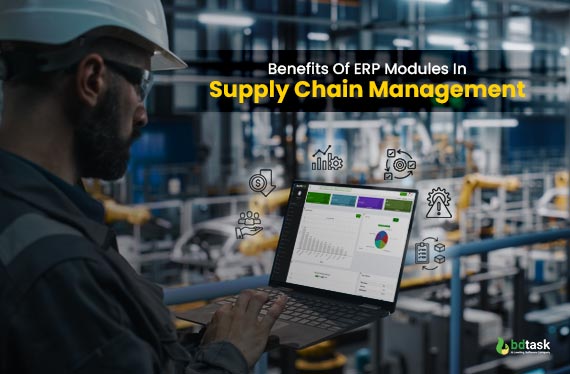
AddingSales ERP software is a bang for the supply chain management strategy. Let's explore some of the benefits of ERP in supply chain management.
1. Improve Total Efficiency & Visibility
ERP system improves supply chain efficiency in many ways. Through automation, companies streamline their functions.
Improve visibility across the supply chain.
Visibility means better tracking through the supply chain. Visibility helps you to understand the inventory levels and the efficiency of deliveries.
ERP systems provide real-time visibility into supply chain operations, enabling businesses to track products at every stage and identify potential bottlenecks.
2. Increased Customer Retention
Implementing ERP in the supply chain fixes all the errors in the supply chain.ERP system facilities better planning streamlined supply chain functions more accurately streamline for daily dates.
3. Cost Savings & Maximising ROI
By optimising inventory levels, streamlining operations, and enhancing efficiency, supply chain management erp modules contribute to cost savings for businesses. Reduced carrying costs, improved productivity, and better resource allocation lead to overall cost reduction.
4. Enhanced Inventory Management
ERP modules offer real-time visibility into inventory levels, allowing businesses to monitor stock levels, track the movement of goods, and identify potential bottlenecks in the supply chain. This real-time information empowers businesses to make data-driven decisions and maintain optimal inventory levels, reducing carrying costs and stockouts.
Demand Forecasting
Accurate demand forecasting is critical for effective inventory management. ERP systems leverage historical data and analytics to provide insights into customer demand patterns. By understanding demand fluctuations, businesses can adjust inventory levels, production schedules, and procurement strategies, ensuring they meet customer demands efficiently.
5. Risk Management
Supply chain management ERP modules help identify potential risks and vulnerabilities by analysing supply chain data. Businesses can implement risk mitigation strategies to safeguard their supply chain against disruptions and uncertainties.
6. Flexibility
ERP systems support production flexibility by enabling efficient coordination between manufacturing units. This flexibility allows businesses to adjust production schedules based on market demands and resource availability.
Eye-Grabbing Supply Chain Management ERP Modules
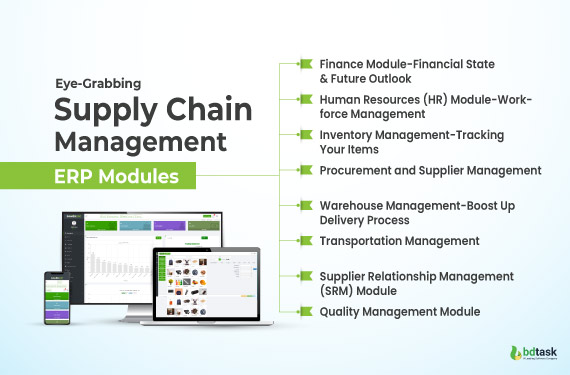
ERP systems offer dedicated modules designed explicitly for supply chain management. These modules include:
1. Finance Module-Financial State And Future Outlook
The finance module is the backbone of any ERP system, handling financial data and transactions.
It includes several sub-modules, which are
- General Ledger
- Accounts Payable
- Accounts Receivable
- Fixed Assets
General Ledger
The general ledger overviews a company's financial transactions, summarising revenue, expenses, assets, and liabilities.
Accounts Payable
It manages the company's outstanding debts to suppliers, automating invoice processing and payment workflows.
Accounts Receivable
Accounts receivable handles the company's incoming customer payments, automating invoice generation and tracking.
Fixed Assets
Fixed Assets tracks and manages the company's fixed assets, such as machinery and equipment, throughout its lifecycle.
2. Human Resources (HR) Module-Workforce Management
The HR module centralises employee data and automates HR processes, ensuring a smooth and efficient workforce management system.
Payroll Management
This module streamlines the payroll process, including salary calculations, tax deductions, and generating payslips.
Employee Onboarding
Employee onboarding assists in seamlessly integrating new hires into the organisation, providing necessary training and resources.
Performance Management
Performance management evaluates employee performance, sets goals, and provides performance-related feedback.
Time and Attendance
Time and attendance tracks employee attendance, working hours, and leaves, simplifying attendance management.
Since the HRM module holds vast information on every employee across the organisation, it eliminates many of the same or incorrect data that many organisations store in various spreadsheets.
3. Inventory Management-Tracking Your Items
Effective inventory management is vital for minimising carrying costs while ensuring products are readily available when needed. ERP systems track inventory levels, demand forecasting, and automated replenishment.
- Stock Control tracks inventory levels, preventing stockouts and overstock situations.
- Order management streamlines the order fulfilment process, from order placement to delivery.
Businesses that limitation to other supply chain management modules may also operate the inventory management application to manage purchase orders, sales orders, and shipping.
4. Procurement and Supplier Management
supply chain management erp modules for procurement enable businesses to manage
- Supplier relationships
- Track purchase orders,
- Streamline procurement processes.
It ensures timely and cost-effective sourcing of raw materials and components.
5. Warehouse Management-Boost Up Delivery Process
Warehouse management modules in ERP systems optimise storage, picking, and packing processes. They help organisations maximise warehouse space, reduce errors, and improve order fulfilment accuracy.
Demand Planning and Forecasting
Accurate demand planning and forecasting are critical for optimising inventory levels and meeting customer demands. Supply chain management erp modules equipped with advanced analytics help predict demand patterns and plan production accordingly.
6. Transportation Management
A few of your supply chain's working processes, like your transportation choice, might influence your business.
Transportation management modules streamline the logistics of transporting goods from one location to another. They optimise route planning, carrier selection, and freight cost management.
7. Supplier Relationship Management (SRM) Module
The SRM module focuses on building strong supplier relationships for a smooth supply chain.
The ERP supply chain module helps evaluate supplier performance, track supplier compliance, and manage contracts effectively. By identifying reliable and efficient suppliers, businesses can reduce supply chain disruptions, negotiate better terms, and ensure timely deliveries of high-quality products or services.
8. Quality Management Module
Maintaining high product quality is vital for brand reputation and customer satisfaction. The Quality Management module allows businesses to establish and enforce quality standards across the supply chain management. It facilitates quality checks, tracks product defects, and helps implement corrective actions to ensure consistent product excellence.
Ready to See How Sales ERP Can Help You Grow
Supply chain management ERP modules offer a comprehensive solution to streamline and optimise supply chain operations. By adopting these eye-grabbing ERP modules, companies can achieve a competitive edge in today's dynamic business landscape.
Before you find another solution talk to our team to help you out
Because
Sales ERP is the foundation, and build it out as you grow.
Integrating supply chain capabilities into sales erp software provides that inventory management, financial information, production data and orders management are updated in real-time.
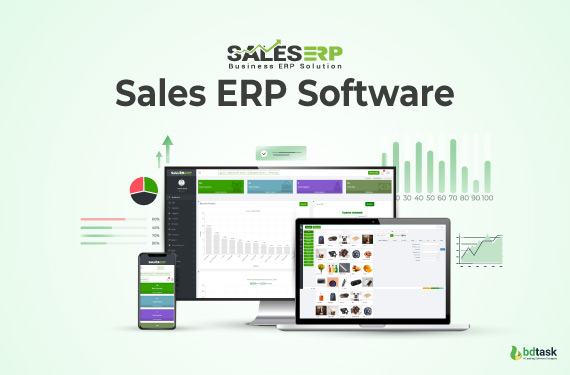
Hence, procurement, planning, and production groups always work from the same up-to-date information.
Final Thought
Supply chain management ERP modules have changed how businesses manage their supply chain process. With the ability to optimise operations and reduce costs, ERP systems are becoming needy tools for companies' seeking sustained growth and success.










